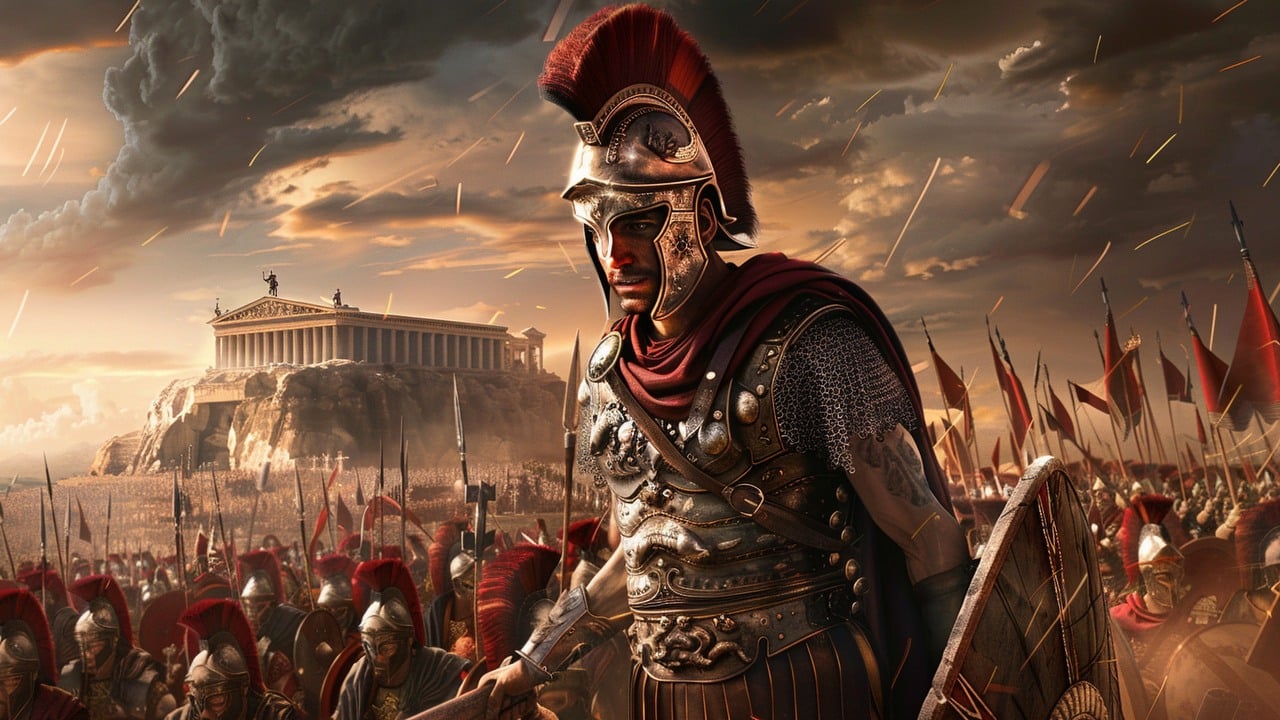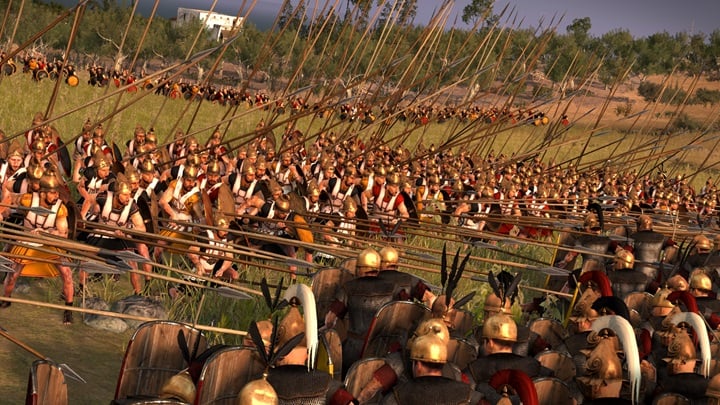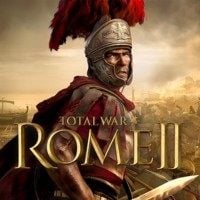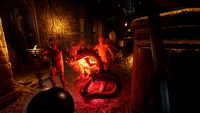Total War Are „Unplayable” for Most of Their Development Time. Hated Developer Reveals Behind-The-Scenes of Rome 2's Disastrous Release
Julian McKinlay slammed the clunky AI in Total War: Rome 2. Even though, he says after more than 10 years, he wasn't responsible for the condition, but the „gross mismanagement” of the project by Creative Assembly heads.

The last moves of Creative Assembly haven't erased the memory of the studio's recent stumbles. The issue was addressed by one of the developers of Total War: Rome 2, who addressed the fateful release of the game, for which he himself was targeted by fans after nearly 10 years.
Rally Point 14
A decade ago, Julian McKinlay was at the forefront of discussions about the second installment of the sub-series TW: Rome. You may not remember it today, but the release of the sequel was disastrous - although not necessarily worse than the recent release of Total War: Pharaoh. It's enough to mention that shortly after the premiere, the devs apologized for the technical condition of the game, primarily optimization, but also for the terrible AI.
This final problem especially angered the fans, due to the 14th episode of Rally Point - a series of Creative Assembly videos dedicated to the Total War series, including Rome 2. In this episode, Julian McKinlay, one of the programmers responsible for artificial intelligence, appeared and praised the advancements in battle AI made in the upcoming installment.
Given that his words clearly contrasted with the actual state of TW: Rome 2 (at least at the premiere), McKinlay became the target of attack from disappointed fans. He was accused, quite frankly, of blatant lying and presenting the game in a false way. The dev even noticed a reference to this in a review of one of the latest installments of the Total War series.
It was CA's recent problems that prompted McKinlay to write a lengthy post on Medium. This is supposed to prove that the British team is still plagued by the same problems, even though - as he claims - some fans blamed him for the terrible AI in Rome 2 and believed that the situation would improve after he left the studio.
Rome wasn't built in a day
McKinlay initially explained two issues. Firstly, he wasn't one of the team leaders, but rather one of many programmers. So he had neither influence over most of the decisions made "at the top," nor a broader understanding of the project's status. He himself tested the AI on trial maps and formed his opinions about the artificial intelligence in Total War: Rome 2 based on that.
Secondly, during his era, every Total War game was considered "unplayable" for most of its development time and was only made suitable in the final months or weeks before its release. This is how the work on all previous installments was supposed to go, on which McKinlay worked, including the widely acclaimed Shogun 2. The creator compared it to "jumping out of an aeroplane and having to assemble your parachute on the way down."
That is why McKinlay had no objection to speaking about artificial intelligence in the 14th episode of Rally Point. The game was far from finished at the time of recording the material - but this was nothing new for the devs and there was no reason to doubt that they would eventually get it right this time as well.
"Once, and well"
This approach worked well in previous installments, but in TW: Rome 2 there was "grossly mismanaged" of the project. McKinlay admitted that even in the best of times, the TW team was "dysfunctional" and in the case of Total War: Rome 2 there could also have been errors in the early stages of production (at least that's what the developer claims with hindsight). Despite this, the development process could have been saved - if it had been managed efficiently.
There was a lack of efficient management. The heads of Creative Assembly were reluctant to view game production through the "iteration" of a ready, playable title - they rather preferred the approach of "do it once, and do it well." However, at the same time, the focus was on marketing, dedicating a significant amount of studio resources to it rather than addressing production issues. The warnings of rank-and-file developers were allegedly ignored.
Communication
So why did Rome 2 ultimately disappoint fans at the premiere? According to McKinlay, one of the main problems turned out to be communication within the team.
For instance: The team was reaching subsequent development milestones without any problems. However, as the dev found out later, none of them were approved by the quality control department (QA). In other words, the developers believed they were making good progress towards releasing the game and were not informed of any concerns raised by the testers.
Partly, this could have been because the same people were in charge of informing the creators and communicating with the players. Internal updates, informing developers about the state of the game, were kept in a similar optimistic tone as the marketing materials and public announcements of TW: Rome 2. This only reinforced the team's mistaken belief about the good state of the project.
McKinlay therefore had no reason to doubt the assurances of the "leaders" that everything was going according to plan.
Production dissonance
McKinlay described one of these "problems," with which he himself was strongly associated: more complex map environments compared to Shogun 2. This made it challenging to design AI to handle pathfinding.
The team decided to solve this by preparing metadata for artificial intelligence for each map - a form, as the dev put it, of "invisible geometry" that would facilitate navigation. Previously, it was also assumed that each city in the campaign would have a single battle map, unlike in Shogun 2.
The only issue was the new city expansion. Unlike previous installments, in Rome 2 cities could occupy subsequent fields on the campaign map as they expanded.
It was indeed contradictory to the concept of having "one battlefield map" for the city. However, as McKinlay claims, for a long time the teams responsible for the campaign and battles were not aware of this problem. It was only in the last few months that they realized the new feature heavily promoted in game promotional materials wouldn't be reflected during battles.
No delays, more maps
If CA wanted to maintain this "marketing" element, it was necessary to add three new maps in different sizes for each city. In the last few months that have separated the team from the planned release date.
In such a scenario, you could choose to postpone the debut of TW: Rome 2 or opt to exclude this element from the premiere and add it afterwards. Both options would give the team the time needed to develop the maps, including their metadata for AI.
So how did the studio deal with this problem? The map designer was instructed to quickly create the missing maps to meet the deadline for the premiere.
In order to extend it to battles, they would need to make three new maps for each of the existing ones, allowing for Small, Medium, Large, and Extra Large battle map options. I think they had a few sensible options, assuming they weren't going to scrap the feature from the campaign side.
They could ship the game as is and accept criticism over the missing battle maps, then add them in a free update once they were made, or they could remove the feature from campaign for launch and restore it in an update along with the maps once they were ready. If neither of those options were acceptable, they could delay the launch of the game.
What they chose instead was to instruct the level designer to rush the creation of the missing maps and get them ready for the launch date as planned.
Replacing one variant with four meant effectively quadrupling the level design workload, and this was happening in the final stages of the project while we were already working overtime to fix bugs and get the game finished.
Design recommendations and departure from the studio
Explaining the amount of work required for multiplying the number of battle maps in the game is unnecessary, especially considering that the game was supposed to be almost finished. There was also no time to test these locations, including the metadata state for AI, which resulted in them being full of bugs. This led to units getting lost in the open clearing or failing to respond to the player's commands.

Of course, there could also be other errors in the operation of artificial intelligence, as McKinlay himself admits. However, it's worth considering how many of these bugs would have remained until the release if the developers had not spent the remaining time before the debut on hastily developing metadata for new maps and adjusting AI to subsequent project modifications.
And this is just part of the problem. McKinlay also argues that some of the shortcomings in artificial intelligence were due to assumptions, as the designers of Rome 2 were supposed to claim that players "enjoy being able to dominate AI" and shouldn't be deprived of this pleasure. It was supposed to be another example of the "designers" and CA heads ignoring the comments of rank-and-file employees.
Moreover, as McKinlay claims, this is precisely why he left Creative Assembly - he believed that his opinions had upset the management, which also did nothing to clear his name in the eyes of the fans (although the developer admits that this might have been due not so much to malice, but a lack of "motivation" to intervene).
Undeserved criticism?
This type of sudden changes wasn't supposed to be unusual for the developers of Total War. Moreover, the exact same problems are still said to be troubling Creative Assembly studio. The disastrous premiere of "Pharaoh" was to be owed to the emphasis on "marketing" (and monetization) at the expense of development - at least if unofficial reports are to be believed.
Of course, it should be emphasized that we have no confirmation of McKinlay's words. It's true that another former studio employee (Craig Laycock) also spoke on the matter, but he focused mainly on the behind-the-scenes of the Rally Point series as such (via X).
However, he at least confirmed several of McKinlay's pieces of information: that behind the scenes the game was still being "assembled," and that this wasn't something new for the studio. And also, practically nothing has been done about the fact that he, Laycock, and Will Overgard (another creator of Rally Point, who also doesn't deny McKinlay's words) have come under attack from fans. Even though they themselves weren't to blame for the state of TW: Rome 2 at the day of premiere.
Today, over a decade after the release of Rome 2, it still holds up well and it's easy to forget how poorly this title performed technically on the day of its premiere. Pharaoh also has a chance to recover, as happened with Total War: Warhammer 3. Has the Creative Assembly studio truly learned from its past failures and will it avoid making the same mistakes again, if we believe McKinlay's words?
On a side note: This wasn't the first report to cast doubt on McKinlay's accountability for the state of AI in Rome 2 at its release. Last year, it was reported that the programmer was one of the critics of another controversial game solution (via Reddit).
0

Author: Jacob Blazewicz
Graduated with a master's degree in Polish Studies from the University of Warsaw with a thesis dedicated to this very subject. Started his adventure with gamepressure.com in 2015, writing in the Newsroom and later also in the film and technology sections (also contributed to the Encyclopedia). Interested in video games (and not only video games) for years. He began with platform games and, to this day, remains a big fan of them (including Metroidvania). Also shows interest in card games (including paper), fighting games, soulslikes, and basically everything about games as such. Marvels at pixelated characters from games dating back to the time of the Game Boy (if not older).
Latest News
- End of remote work and 60 hours a week. Demo of Naughty Dog's new game was born amid a crunch atmosphere
- She's the new Lara Croft, but she still lives in fear. Trauma after Perfect Dark changed the actress' approach to the industry
- „A lot has become lost in translation.” Swen Vincke suggests that the scandal surrounding Divinity is a big misunderstanding
- Stuck in development limbo for years, ARK 2 is now planned for 2028
- Few people know about it, but it's an RPG mixing Dark Souls and NieR that has received excellent reviews on Steam, and its first DLC will be released soon


